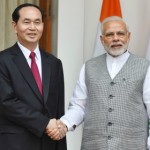This is the transcript of a speech that the author gave as chair at a panel discussion on ‘Geopolitics in the Indo-Pacific: Implications on Maritime Security for India and Vietnam’, organised by the Centre for Indo-Pacific Studies, SIS, Jawaharlal Nehru University.
- Maritime security, in the backdrop of unfolding developments in the Indo-Pacific, stays at the top of the agenda for India-Vietnam dialogue.
- As evident from the following:
- First Bilateral Maritime Dialogue is scheduled to be held in Vietnam in early 2019.
- Recall the address by the Indian President in Hanoi on 20 November 2018 when he stated: “The ocean system is a resource for Vietnam and India … (They) share a vision for the Indo-Pacific region …. India looks forward to enhanced bilateral cooperation in the maritime domain.”
- The third Indian Ocean Conference hosted by India Foundation was held in Hanoi in August 2018.
- India-ASEAN dialogue on Blue Economy was coordinated by Vietnam on behalf of ASEAN. At the second workshop in Delhi in July 2018, a senior Indian official stated that this realm had “tremendous scope” for cooperation.
- A host of measures, already in place, show that cooperation at policy and field levels between the Navies and Coast Guards of our two countries has been rising steadily.
- Maritime security-related cooperation has two facets – strategic and economic, and they are inter-related.
- On the strategic and security facet, we tend to focus on non-traditional threats (piracy, terrorism, drug trafficking, natural disasters etc.) and strive to intensify our cooperation. The unstated assumption is that, when the need arises, our naval forces will be ready to address the traditional threats. These can come only from states which do not share our vision of a peaceful, equitable and rule-based Indo-Pacific.
- In this context, there are many questions that our Panelists might care to address today. I list a few:
- Is Indo-Pacific a theoretical concept, a geopolitical construct, or a real state strategy? Are almost all players in the region willing to accept it? Is there a growing consensus on its geographic contours?
- Do Vietnam and India have an identical vision of the Indo-Pacific, or are there substantial differences that need to be reconciled?
- What is our real position on the Quad and its need to engage with key ASEAN countries such as Vietnam, Indonesia and Myanmar? Is there a contradiction or potential convergence between Quad and ASEAN centrality?
- What is the current thinking within ASEAN on these issues? What are the prospects of the success of Indonesia’s diplomatic initiative to promote an inclusive Indo-Pacific, anchored in a more effective East Asia Summit?
- On the broad question of connectivity, Alice Wells, a senior U.S. official, pointed out that Asia needs an estimated $26 trillion for infrastructure development by 2030, which can come only from the private sector. How is China’s BRI performing? Are there viable alternatives to it? Are America’s ARIA (Asian Resurgence Initiative Act), India-Japan collaboration on Growth Corridor, India’s SAGAR, and Australia’s SARIC (South Asia Regional Infrastructure Connectivity) viable alternatives to BRI? Or, as a leading expert wrote recently: “While China acts, others only talk.”
- Since economic development is the way to strengthen over-all security, are our two countries ready to engage with business and industry to promote mutually beneficial collaboration for harnessing opportunities of sustainable Blue Economy? Or, will this cutting-edge concept remain confined to the seminar rooms of universities and think tanks?
Like all of you, with this hall full of interested and attentive participants, I look forward to a stimulating exchange of ideas at this valedictory session. We need to make our own contribution to what has already proved to be an exceptionally fruitful conference.
Thank you for attention.
Rajiv Bhatia is Distinguished Fellow, Foreign Policy Studies, Gateway House
These remarks were given at a panel discussion that the author chaired at Centre for Indo-Pacific Studies, SIS, Jawaharlal Nehru University on January 22, 2019.
For interview requests with the author, or for permission to republish, please contact outreach@gatewayhouse.in.
© Copyright 2019 Gateway House: Indian Council on Global Relations. All rights reserved. Any unauthorized copying or reproduction is strictly prohibited


